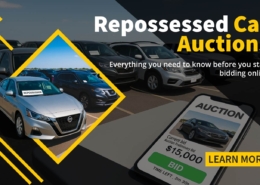 https://auction.ridesafely.com/images/2025/09/reserve-vs-no-reserve-auction-banner.jpg
865
1440
RideSafely
/images/2025/01/ridesafely-logo.svg
RideSafely2025-09-05 15:09:492025-09-08 11:21:31Auction Reserves vs. No-Reserve Auctions: The Complete Guide
https://auction.ridesafely.com/images/2025/09/reserve-vs-no-reserve-auction-banner.jpg
865
1440
RideSafely
/images/2025/01/ridesafely-logo.svg
RideSafely2025-09-05 15:09:492025-09-08 11:21:31Auction Reserves vs. No-Reserve Auctions: The Complete GuideBank and Repo Vehicle Auctions Explained
Bank and repossessed (repo) vehicle auctions allow buyers to get vehicles at much lower prices. At RideSafely, we provide direct access to thousands of cars that banks and financial institutions repossessed. This guide breaks down the essentials of bank and repo auctions, including how the process works, the advantages of buying through these auctions, and helpful tips to improve your chances of success.
What Are Bank and Repo Auctions?
Bank and repo auctions feature vehicles seized by financial institutions due to loan defaults. These auctions aim to recover the remaining loan balance, allowing buyers to bid on vehicles at below-market prices. If you’re interested in exploring more vehicle categories, Explore the Diverse Range of Vehicles Available at RideSafely and find the perfect match for your needs.
Key Characteristics
- Repossessed Vehicles: Reclaimed from borrowers after non-payment.
- Bank-Owned Vehicles: Acquired by banks after foreclosure or voluntary buybacks.
- Diverse Vehicle Types: Includes sedans, SUVs, trucks, and luxury models.
- Condition Disclosure: Vehicles are sold “as-is,” with condition reports available.
How Bank and Repo Auctions Work
To make the most of these auctions, understanding the process is essential. Here’s a step-by-step breakdown:
1. Vehicle Repossession and Inspection
Financial institutions repossess vehicles after loan defaults. These vehicles undergo initial inspections to assess their condition.
2. Listing and Auctioning
Repossessed vehicles are sold through insurance auctions or on online platforms like RideSafely, where buyers can browse and place bids without needing a dealer license.
3. Bidding and Closing
Buyers place bids in real-time. Auctions may include reserve prices set by the banks, ensuring the vehicle isn’t sold below a minimum threshold.
4. Payment, Title Processing, and Shipping Details
Winning bidders must complete the payment within a specified period. After payment, the vehicle can be picked up from the auction facility by the buyer or a hired transportation company. The title ownership documents will be processed and reassigned to the buyer. The title will then be shipped to the registered address.
For those interested in securing vehicles without a dealer’s license, Buy Cars at Wholesale Auctions: No Dealer License is Required offers a detailed guide on how to navigate such auctions.
Why Bank and Repo Auctions Are Worth Exploring
1. Significantly Lower Prices
Since banks prioritize recovering outstanding debts, vehicles are often sold below market value. To further maximize your returns, consider learning how to Turn Profits While You Learn with Salvage Car Auctions, where vehicles are available at similarly reduced prices.
2. Diverse Selection of Vehicles
From compact cars and SUVs to high-end luxury vehicles, repo auctions offer a broad range of options.
3. Fast and Transparent Process
Auctions move quickly, and detailed condition reports provide transparency, helping buyers make informed decisions.
Potential Risks and Considerations
1. As-Is Vehicle Sales
Repo vehicles are typically sold without warranties. Buyers assume responsibility for repairs and maintenance. For buyers considering alternative auction types, Finding and Buying Impounded Cars provides insights on another cost-effective way to acquire vehicles.
2. Limited Vehicle History
While condition reports and vehicle history information are provided, some repossessed vehicles may have incomplete service records.
3. Increased Competition
Popular vehicle models may attract intense competition, driving up final auction prices.
How to Participate in Bank and Repo Auctions
1. Create an Auction Account
To place bids, buyers must create an account on platforms like RideSafely. Registration requires valid identification — a driver’s license for US-based buyers or a passport for those planning to export — along with a security deposit to activate their bids.
For those seeking reliable and affordable options, Smart Guide to Buying Former Rental Cars highlights another route to acquiring well-maintained vehicles.
2. Review Vehicle Listings
Carefully review condition reports, vehicle history, and photos to assess potential risks.
3. Set a Budget and Bidding Strategy
Establish a maximum bid amount based on the vehicle’s value, factoring in possible repairs and additional costs.
4. Bid Confidently
Place competitive bids while remaining within your pre-determined budget.
Pro Tips to Succeed in Repo Auctions
1. Research Vehicle Values Thoroughly
Compare the auction price with current market rates using sources like Kelley Blue Book and Edmunds. If you’re looking to broaden your auction knowledge, Explore the Diverse Range of Vehicles Available at RideSafely offers insights into different vehicle types and their market value.
2. Inspect Condition and Title Reports
Ensure the vehicle has a clean title and review reports from the National Motor Vehicle Title Information System (NMVTIS). Learn more: What does NMVTIS stand for?
3. Budget for Additional Expenses
Include transportation fees, buyer premiums, and potential repairs when calculating the overall cost.
RideSafely’s Advantage in Bank and Repo Auctions
1. User-Friendly Interface
RideSafely offers an intuitive platform where buyers can easily browse listings, place bids, and track auction progress in real time.
2. Access to Exclusive Inventory
RideSafely provides free access to thousands of repossessed and bank-owned vehicles nationwide, allowing buyers to browse and bid without needing a dealer license.
3. Expert Assistance and Support
RideSafely’s experienced team provides expert guidance throughout the auction process, complemented by a database of over 500 searchable questions and answers in the Help Center, contributed by customers like you, ensuring a seamless and successful buying experience.
Conclusion: Maximize Your Savings with Bank and Repo Auctions
Bank and repo auctions provide a unique opportunity to purchase reduced-price vehicles while accessing a diverse inventory. By conducting thorough research, reviewing condition reports, and following expert bidding strategies, buyers can confidently secure great deals. RideSafely’s platform simplifies the process and ensures a seamless auction experience from start to finish.
For additional resources on auction strategies, explore Salvage Car Auctions – Turn Profits While You Learn and enhance your auction expertise.
FAQs About Bank and Repo Auctions
What is the difference between bank-owned and repossessed vehicles?
- Bank-Owned Vehicles: These vehicles are typically acquired by banks or financial institutions after foreclosure or voluntary buybacks. In these cases, the lender takes possession of the vehicle when the borrower voluntarily returns it or fails to meet the terms of the loan. Bank-owned vehicles may undergo thorough inspections before being listed for sale.
- Repossessed Vehicles: Repossessed (repo) vehicles are taken back by lenders when the borrower defaults on the loan. Repossession can happen after multiple missed payments or failure to meet financial obligations. These vehicles are often sold quickly at auction to recover the remaining loan balance.
Are vehicles sold at repo auctions always in poor condition?
No, not all repo vehicles are in poor condition. While some repossessed vehicles may require minor repairs due to neglect or misuse, others are in excellent condition with minimal wear and tear. Buyers can review detailed condition reports and photos to assess the vehicle’s state before bidding. Some vehicles may even have been well-maintained by previous owners but were repossessed due to financial difficulties.
Can I inspect the vehicle before placing a bid?
Most online auction platforms, including RideSafely, provide high-quality images, condition reports, and detailed vehicle descriptions to help buyers make informed decisions. However, physical inspections are typically not allowed in online auctions. It is crucial to carefully review all available information and consider requesting a vehicle history report to verify ownership, accident history, and maintenance records.
What types of vehicles are available in bank and repo auctions?
Bank and repo auctions offer a wide variety of vehicles, including:
- Sedans and Compact Cars – Ideal for daily commuting and budget-conscious buyers.
- SUVs and Crossovers – Popular for families and off-road enthusiasts.
- Luxury and High-End Vehicles – High-value cars often repossessed due to financial default.
- Pickup Trucks and Commercial Vehicles – Useful for work and transportation needs.
- Motorcycles and Recreational Vehicles (RVs) – Occasionally available in repo auctions.
Do repo vehicles come with a title?
Yes, repossessed and bank-owned vehicles come with a title. However, it is essential to check the title status before bidding. Titles can be:
- Clean Title: No major accident history or prior damage.
- Salvage Title: Indicates previous damage that led to an insurance claim where the vehicle was declared a total loss.
- Rebuilt Title: Issued after a salvage vehicle has been repaired and deemed roadworthy.
Buyers should verify the title status to avoid any surprises after purchase.
Are there additional fees associated with repo auction purchases?
Yes, repo and bank auction purchases may involve several additional fees, including:
- Buyer’s Premium: A percentage of the final bid added to the total price.
- Documentation Fees: Charges associated with transferring ownership and title.
- Storage and Transport Fees: If the vehicle is not picked up within the designated period, storage fees may apply. Buyers can also opt to have the vehicle transported, incurring additional costs.
What is the payment process after winning a bid?
After winning a bid, the payment process typically follows these steps:
- Payment Deadline: Payment must be completed within 1-2 business days after the auction closes.
- Accepted Payment Methods: Most auction platforms accept wire transfers, cashier’s checks, and other verified payment options.
- Late Payment Penalties: Failure to meet the payment deadline may result in penalties or forfeiture of the winning bid.
How long does it take to receive the vehicle after purchase?
The timeline for receiving a vehicle depends on factors such as auction title submission delays, processing volumes, and DMV backlogs. Typically:
- Title Transfer and Documentation: Processing time can take 7–30 business days.
- Vehicle Pickup or Delivery: After completing payment and documentation, buyers can either schedule a pickup or arrange for transportation. Delivery times vary based on distance and chosen carrier service.
What happens if I change my mind after winning an auction?
In most cases, auction bids are legally binding and cannot be canceled or retracted after winning. Failure to complete the transaction may result in account suspension, financial penalties, and loss of the security deposit. Buyers should carefully review auction terms and conditions before placing bids.
Is financing available for vehicles purchased at repo auctions?
Most online auction platforms do not offer direct financing for vehicles purchased at repo auctions. However, buyers can secure financing through third-party lenders or banks before participating in the auction. It’s essential to obtain pre-approval for financing to ensure a smooth transaction after winning a bid.
Can I return a vehicle if I’m not satisfied with the purchase?
Repo and bank-owned vehicles are generally sold as-is, without warranties or guarantees. Buyers cannot return the vehicle after purchase, making it critical to review condition reports and vehicle history thoroughly before bidding. Some auction platforms may offer arbitration options in rare cases where undisclosed issues arise.
Are bank and repo auctions open to the public?
Yes, many online platforms like RideSafely allow public access to bank and repo auctions. While some auctions may require dealer licenses, others permit public participation, giving individual buyers a chance to purchase vehicles without a dealer’s license.
What documents do I receive after winning a vehicle?
Upon successful payment and completion of the auction, buyers typically receive:
- Bill of Sale: Proof of purchase for the vehicle.
- Title Documentation: The original vehicle title (clean, salvage, or rebuilt).
- Vehicle Condition Report: Detailed information on the vehicle’s status before auction.
How can I maximize success at bank and repo auctions?
To succeed in repo auctions, follow these tips:
- Set a Budget: Define your spending limits, including repair and transportation costs.
- Research Vehicle History: Use NMVTIS reports and other reliable sources to verify title status.
- Understand Auction Terms: Familiarize yourself with auction policies and procedures to avoid unexpected surprises.






Leave a Reply
Want to join the discussion?Feel free to contribute!